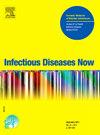社区获得性急性肺炎的抗生素联合适应症。
IF 2.2
4区 医学
Q2 INFECTIOUS DISEASES
引用次数: 0
摘要
经验性β -内酰胺和大环内酯双重联合治疗通常是非重症监护病房住院成人社区获得性急性肺炎(CAP)的标准治疗。然而,最近的一些研究对这种标准治疗提出了质疑。目前的文献综述分析了比较β -内酰胺单药治疗和双重抗生素治疗中度CAP的现有数据。大环内酯类药物与频繁的不良事件(消化、心血管)以及细菌耐药性增加有关,其在非严重形式CAP中的临床益处尚未得到证实。三个高质量的随机试验没有显示双重抗生素治疗患者死亡率的降低,一项大规模的观察性现实研究没有显示双重抗生素治疗的临床优势。只有患有严重CAP的患者才能从添加大环内酯中获益,因为它覆盖了非典型细菌(并且可能是因为它的免疫调节特性)。考虑到目前的知识状况,β -内酰胺单药治疗似乎是足够的,并且在中度CAP中更可取,因此可以减少大环内酯类药物的暴露及其后果。2025年指南确认没有针对轻度CAP的双抗生素治疗指征(潘通-瓦伦丁产白细胞素金黄色葡萄球菌除外)。对于因严重CAP住院的患者,也推荐经验性双抗生素治疗,根据临床进展和微生物学结果迅速降级为单药治疗。本文章由计算机程序翻译,如有差异,请以英文原文为准。
Antibiotic combination indications for the treatment of community-acquired acute pneumonia
Empirical dual combination therapy with beta-lactam and macrolide is often the standard treatment of community-acquired acute pneumonia (CAP) in adults hospitalized in non-intensive care units. However, several recent studies question this standard treatment. The present literature review analyzes available data that compare beta-lactam monotherapy and dual antibiotic therapies in moderate CAP. Macrolides are associated with frequent adverse events (digestive, cardiovascular) as well as with an increase in bacterial resistance, and their clinical benefit in non-severe forms of CAP has yet to be proven. Three randomized trials of good quality did not show any reduction in mortality in patients treated with dual antibiotic therapy, and a large-scale observational real-life study did not show the clinical advantage of dual antibiotic therapy. Only patients with severe CAP could benefit from the addition of a macrolide as it covers atypical bacteria (and potentially because of its immuno-modulatory properties). Considering the current state of knowledge, beta-lactam monotherapy seems to be enough and preferable in moderate CAP, thus allowing to reduce exposure to macrolides and their consequences. The 2025 guidelines confirm the absence of indication for dual antibiotic therapy for mild documented CAP (except for Panton-Valentine leukocidin-producing S. aureus). Empirical dual antibiotic therapy is also recommended for patients hospitalized for severe CAP, with rapid de-escalation to monotherapy depending on the clinical evolution and microbiological results.
求助全文
通过发布文献求助,成功后即可免费获取论文全文。
去求助
来源期刊

Infectious diseases now
Medicine-Infectious Diseases
CiteScore
7.10
自引率
2.90%
发文量
116
审稿时长
40 days
 求助内容:
求助内容: 应助结果提醒方式:
应助结果提醒方式:


